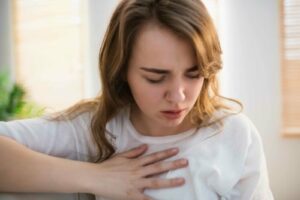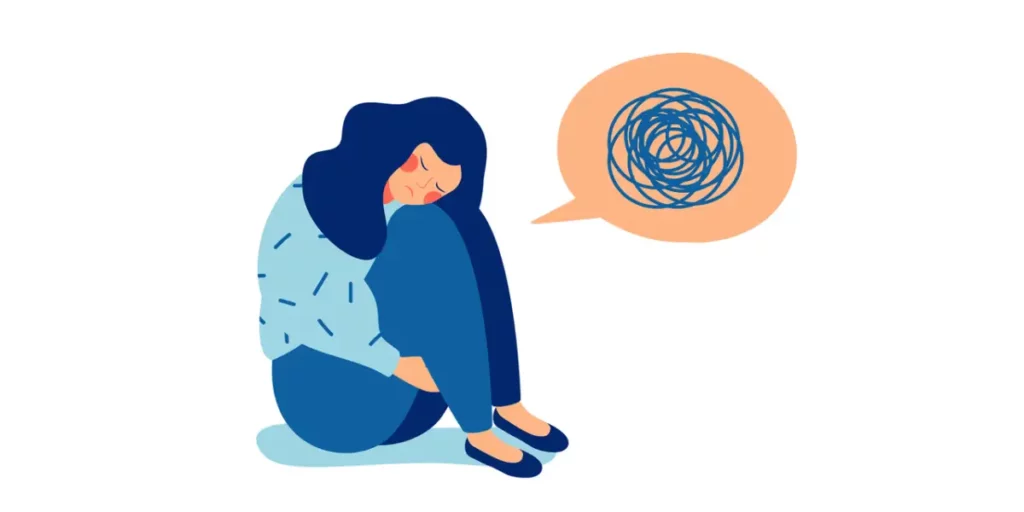Do you suffer from anxiety or chest pain? If so, you are not alone. Anxiety and chest pain is a very common problems. In this blog post, we will discuss the top 10 anxiety chest pain treatment options. We will also provide tips on how to reduce or prevent anxiety and chest pain.
Contents
Understanding Anxiety Chest Pain
 Anxiety chest pain is a symptom of an anxiety attack, panic attack, or other disorder. Anxiety chest pain can feel like a sharp, stabbing pain or a dull ache. This type of chest discomfort may come and go, and it may be experienced differently from person to person. The intensity and duration of the chest pain will vary depending on the underlying cause.
Anxiety chest pain is a symptom of an anxiety attack, panic attack, or other disorder. Anxiety chest pain can feel like a sharp, stabbing pain or a dull ache. This type of chest discomfort may come and go, and it may be experienced differently from person to person. The intensity and duration of the chest pain will vary depending on the underlying cause.
Anxiety chest pain typically occurs in the center of the chest. But it may also radiate out towards other areas, such as the arms or abdomen. It may be accompanied by other physical symptoms of anxiety, such as increased heart rate and sweating, as well as psychological symptoms like fear and worry. Therefore, it is important to find ways to anxiety chest pain treatment and relief.
Different Anxiety Chest Pain Treatment Options
As anxiety chest pain is very much a physical and mental state, the best treatment options involve both medical and psychological therapies. Here are the top 10 anxiety chest pain treatment options for you:
Cognitive Behavioral Therapy (CBT)
CBT is a form of psychotherapy that helps patients understand and change their thoughts, behaviors, and reactions to situations that trigger anxiety. Through regular sessions with a licensed therapist, you can learn how to challenge your worrying thoughts. As well as how to better manage stress and other symptoms associated with anxiety and chest pain. It is often used as a treatment for panic disorder, generalized anxiety disorder, and other conditions.
Relaxation Techniques
Relaxation techniques such as deep breathing, progressive muscle relaxation, visualization, and yoga can help reduce the physical symptoms of anxiety and chest pain. Regular practice of these techniques can help you to better manage stress levels and keep your body in a relaxed state. For example, you can practice deep breathing exercises while lying down in a comfortable position.
Medication
There are some medications available that can help reduce the symptoms of anxiety and chest pain such as selective serotonin reuptake inhibitors (SSRIs) and benzodiazepines. These medications can help reduce the intensity of your symptoms and allow you to better manage stress levels. However, these medications can have some side effects and should be taken under the supervision of a medical professional.
Physical Activity
Regular exercise can help reduce tension in the body as well as mental stress. Exercise releases endorphins, which can help boost your mood and reduce anxiety. There are several types of physical activities you can try such as walking, cycling, running, swimming, or any other form of aerobic exercise. Make sure to include some form of physical activity in your daily routine to help reduce the symptoms of anxiety and chest pain.
Diet and Nutrition
Eating a healthy and balanced diet is essential for overall health and well-being. Eating foods that are rich in nutrients, vitamins, minerals, and antioxidants can help reduce the symptoms of anxiety and chest pain. Some foods that can help reduce stress levels include dark chocolate, fatty fish, chamomile tea, and bananas. When you are following a good diet and nutrition habits, can help you better manage stress levels and reduce the intensity of your symptoms.
Herbal Supplements
 In many cases, herbal supplements can help reduce the symptoms of anxiety and chest pain. Some herbal supplements that may be beneficial include passionflower, valerian root, chamomile, kava root, and lavender. Make sure to consult with a medical professional before taking any herbal supplement as some may interact with other medications or cause side effects.
In many cases, herbal supplements can help reduce the symptoms of anxiety and chest pain. Some herbal supplements that may be beneficial include passionflower, valerian root, chamomile, kava root, and lavender. Make sure to consult with a medical professional before taking any herbal supplement as some may interact with other medications or cause side effects.
Acupuncture
It is a form of traditional Chinese medicine that involves inserting thin needles into the skin at specific points in order to stimulate healing. This can help reduce physical and mental stress, improve blood circulation, and reduce the intensity of anxiety and chest pain. Acupuncture is a safe and effective method for treating conditions such as anxiety and chest pain.
Aromatherapy
Another treatment option to consider is aromatherapy. This involves using essential oils such as lavender, chamomile, and eucalyptus to help relax the body and reduce stress levels. These essential oils can be inhaled, used in a diffuser, or applied directly to the skin. Aromatherapy can help reduce the physical symptoms of anxiety and chest pain.
Visualization
When you are having anxiety and chest pain, it can be helpful to practice visualization. This involves closing your eyes and imagining yourself in a pleasant and calming environment. You can imagine yourself walking on a beach or in a peaceful forest. This can help you to relax your body and reduce the intensity of your symptoms.
Support Groups
Finally, joining a support group can be beneficial for those dealing with anxiety and chest pain. Support groups provide a safe and supportive environment in which people can share their experiences and offer advice and support. Being part of a support group can help reduce stress levels, provide emotional relief, and give you the motivation to take care of your health.
Overall, there are many treatment options available for those dealing with anxiety and chest pain. It is important to find a treatment plan that works for you and to remember to be patient as it may take some time before the symptoms start to improve. Additionally, talk to your doctor if you are considering any of these treatments for anxiety and chest pain. They can help guide you on which treatment option is right for you and provide additional support along the way.
Can I Prevent Anxiety Chest Pain?
 Well, this depends on the underlying cause of your anxiety and chest pain. If the pain is caused by a medical condition, then it’s important to talk with your doctor about treatment options that may help prevent or reduce further episodes. However, if the chest pain is due to an anxiety disorder, there are ways you can try to prevent it. These might include:
Well, this depends on the underlying cause of your anxiety and chest pain. If the pain is caused by a medical condition, then it’s important to talk with your doctor about treatment options that may help prevent or reduce further episodes. However, if the chest pain is due to an anxiety disorder, there are ways you can try to prevent it. These might include:
- Identify your triggers: When does your chest pain usually start? Are there certain situations or activities that make it worse? If you can identify potential triggers, you may be able to avoid them or prepare yourself better.
- Practice relaxation techniques: Relaxation exercises, such as deep breathing, meditation, and yoga can help ease anxiety symptoms and reduce chest pain.
- Exercise regularly: Exercise can help reduce stress and anxiety, as well as strengthen your heart. Make sure to talk with your doctor before starting any exercise program.
- Get enough sleep: Not getting enough sleep can make you more prone to anxiety, so try to get seven to eight hours of quality rest every night.
- Talk to a therapist: A mental health professional can help you better understand your anxiety and develop strategies to manage it.
- Take medications as prescribed: If your doctor prescribes medication, make sure to take it as directed and follow up with them regularly.
These are just some of the things you can do to try to prevent episodes of anxiety and chest pain. It’s important to talk with your doctor if you are worried about chest pain and discuss any steps you can take to help manage it.
How Long Does Anxiety Chest Pain Last?
If you experience chest pain due to anxiety, it can last for up to 10 minutes. However, the duration of the pain can vary depending on the severity of your symptoms and how you manage them. If your chest pain is severe or persistent, seek medical attention right away. Anxiety chest pain usually feels like a tightness or pressure in the chest area.
It may also cause shortness of breath, a racing heart rate, or sweating. Other symptoms may include numbness in the arms or hands, dizziness, nausea, and fatigue. Be sure if any of these symptoms are present seek medical attention immediately.
Fortunately, there are several methods you can use to help reduce anxiety and chest pain and manage your symptoms. The right intervention plan can help you better cope with this condition.
Conclusion
To conclude, anxiety chest pain treatment is an important part of managing and relieving symptoms. It is essential to consult with a medical professional in order to determine the root cause of the pain. As well as possible treatments that could help alleviate it.
Generally, the combination of lifestyle changes, medications, relaxation techniques, and possibly therapy or counseling can be effective in managing anxiety and chest pain. It is important to remember that with proper treatment, most people are able to manage this pain and live healthy life.
For more information, please contact MantraCare. Anxiety is a feeling of fear, worry, and unease often related to an upcoming event or uncertain outcome. If you have any queries regarding Online Anxiety Counseling experienced therapists at MantraCare can help: Book a trial Anxiety therapy session


